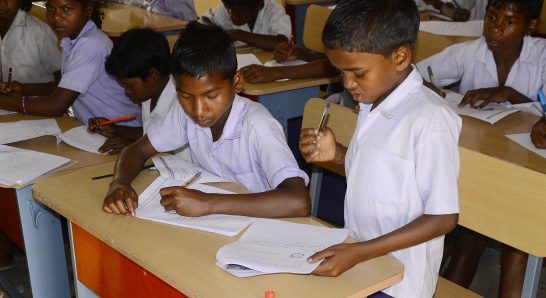
Getting Primary Schools in India to Deliver
Orhan Pramanuk, the Turkish Nobel laureate in literature while discussing creative labor in the World Development Report 2015 relates to an anecdote on Gauss, the celebrated German mathematical genius.
“There is a charming anecdote about the German mathematician Carl Friedrich Gauss. According to the version our mathematics teacher in Istanbul told us, a class of high school students in Germany was misbehaving (much like we were), and to punish them, their teacher told them to add up all of the numbers from one to one hundred. One of the students—Gauss himself—suddenly realized that the sum of the first and last number, the second and second-to-last, and so on, was always 101. Noting, too, that there were 50 such pairs of the first hundred numbers, it took him two minutes to work out the total (5,050) and come up with his famous formula to find it—saving him hours, possibly even days of calculations.”
One shudders to think what would have happened had Gauss not been taught how to add at school.
Gauss would have been left without the tools to prove his genius. Scores of government-run primary schools in rural India are failing to equip the students even with the basics of the 3Rs (to read, write and arithmetic), leave alone familiarizing the pupils with higher-order scholastic pedagogy.
Zivanta Analytics Social & Public Sector consulting team does extensive work on assessment and strategy formulation for a number of corporate for their CSR initiatives in the area of elementary education, mostly in rural areas. Across states from West Bengal to Jharkhand, to Uttar Pradesh and more, the singular refrain of Zivanta Analytics researchers has been that our rural school classrooms are not delivering in terms of learning outcomes of the wards under its tutelage.
In a remarkable piece of policy making, Government of India took the issue of education inequality head-on by proposing to make elementary education a fundamental right. The Constitution Act (Eighty-sixth Amendment) Act, 2002, inserted Article 21-A in the Constitution of India to provide free and compulsory education of all children in the age group of six to fourteen years as a Fundamental Right. The consequential legislation is known as the Right to Education Act 2009.
Public investment towards big push in improving school education has been largely confined to provisions and infrastructure. The country has taken major strides in ensuring the essential infrastructure and facilities are put in place. These emanate in the provision of primary schools in easy reach of students, push for enrollment, school infrastructure, teacher recruitment and mid-day meals. The effort towards provisioning of key infrastructure elements in our primary schools has been impressive. With a national commitment to budgetary support towards primary education, it can be reasonably expected that the gaps will subsequently get bridged.
The question now arises is whether the impressive performance in provision, inputs and infrastructure has translated into better learning outcomes in our primary school classrooms. The answer is, unfortunately, ‘NO’. Better infrastructure, increasing the number of teachers, midday meal, and more schools and putting the children into the classroom is a necessary but not a sufficient condition for ensuring education is delivered. The Right to Education has ensured the right to sit in a school, the right to get educated still remains elusive.
Zivanta Analytics extensive work on the ground does give us reasons to believe that lost ground can be regained. Zivanta Analytics experts have come out with a slew of strategies for CSR interventions in government-run Primary schools to improve learning outcomes. A number of such recommendations and strategies are under implementation on the ground with encouraging results. Some of the suggested measures include:
- Student Dashboards: With the option of failing a student if he/she does not achieve the requisite standards is no longer an option in the current education regime in primary schools; the sting has been taken out of the examinations. Zivanta Analytics assessors strongly recommend that regular school examinations should be used to monitor teacher’s performance in delivering the requisite lessons in the classroom. Further performance at a disaggregate level for each student is monitored and feedback given to the teacher. This strategy emanates from the fact that if the teacher fails to deliver in the classroom, the crores of rupees spent in primary education will come to a naught. Monitoring of teacher performance through student performance is critical. Zivanta Analytics designs and implements such dashboards.
- Putting Para Teachers in Place to avoid multi grace teaching: Zivanta Analytics strongly recommends to its CSR clients to put a para teacher so that the multilevel teaching can be minimized. Most of the primary schools do not have the full complement of teaching staff. Thus, it is fairly common to see students of classes 1-3 sitting in one class and so for higher classes as well.
- Specific Teaching-Learning Hours: To improve the basic numeracy and language skills, the recommended writing and reading hours as specified under the Padhe Bharat, Badhe Bharat program is implemented.
- Promote learning beyond the curricula – music, dance, theater, craft and general awareness in target schools: It is an established fact that activity-based learning helps in information retention and creative thinking. It is therefore proposed that Art classes be made a part of the regular school timetable. It is expected that the activities in these periods should supplement the curriculum. Specific periods to be kept aside for Arts and General Awareness classes; the NCERT recommendation may be considered.
- Induct technology in the form of computer teaching and aided learning in the target schools: Use the curricula developed by a number of organizations, including IIT Mumbai for training primary students in the use of computers and using the computer as a learning tool.
- Extra classes for talented/gifted students: It is critical that the school system recognizes talented students and nurtures them beyond the classroom. Talent is a scarce national resource, and it is criminal if it gets wasted due to the absence of proper mentoring and guidance.
There is a slew of other measures like the involvement of the community, use of technology and creative teaching methodologies which Zivanta Analytics regularly advises CSR clients on. Zivanta brings the best of experts in the field, has a proprietary assessment methodology and has the technical wherewithal to induct technology in close monitoring of student performance.

Sudipto Sengupta
Sudipto has 20+ years of experience in working with global consulting firms, government and multilateral institutions. He completed Masters in Urban Design & Planning from Virginia Tech, USA.


Sweet blog! I found it while searching on Yahoo News.
Do you have any tips on how to get listed in Yahoo News? I’ve been trying for
a while but I never seem to get there! Thanks